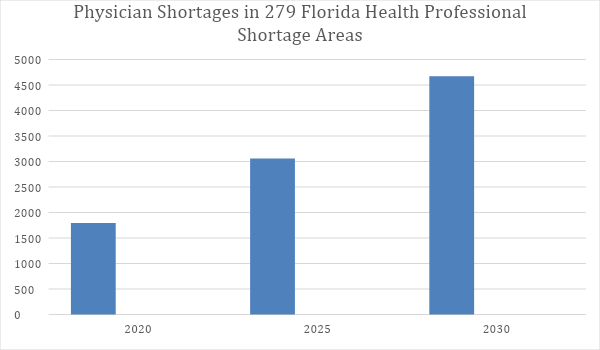With fears of a post-holiday surge in COVID-19 cases building on already rising infection rates, concern that the health care system could be overwhelmed is persistent. Although most states are not experiencing shortages of ICU beds, hospital staffing shortages and burnout are cause for concern. Nearly all 50 states have responded to this threat by loosening or suspending licensing restrictions for health care workers, including Florida.
In Florida back in March 2020, Gov. Ron DeSantis issued Executive Order 20-52, which declared a state of emergency in Florida and allowed health care workers licensed in other states to provide care to Floridians affected by the crisis. Those licensing exemptions came with the caveat that their services “be rendered to such persons free of charge and … under the auspices of the American Red Cross or the Florida Department of Health.”
Later that month, an emergency order from the state surgeon general, Scott Rivkees, further expanded licensing exemptions for out-of-state health care workers for a period of 30 days. That order has since been extended until the end of Florida’s state of emergency, which expired on Jan. 2.
These temporary actions could go a long way toward addressing the current crisis, but another long-term threat requires permanent reform. Florida had a huge problem with not having enough medical professionals even before the pandemic. According to the Association of American Medical Colleges, the U.S. is expected to experience a shortage of up to 139,000 physicians by 2033. In Florida, there are already 279 designated primary care health professional shortage areas covering a population of more than 6.66 million Floridians. An additional 1,793 physicians are required to fill the existing need in those areas. Projections from the Department of Health and Human Services estimate that the shortage of primary care physicians in Florida will more than double to 4,671 by 2030. (See graph.)
Residents of Sarasota already feel the bite of these shortages as new residents struggle to find doctors, especially specialists, willing to take new patients.
Fortunately, Florida has been leading the way on reforms to address the looming physician shortage. In 2019, the Florida legislature took substantial steps toward clearing the way for telehealth providers to operate in Florida. Telehealth services allow health care professionals to provide care remotely through telecommunication or other digital communication technologies. Florida’s recent reforms allow health care professionals licensed in other states to provide telehealth services in Florida without obtaining a separate Florida license. However, they are still required to register as a telehealth provider in the state of Florida.
In 2020, Florida passed comprehensive scope of practice reforms to expand the role of nonphysician providers. Scope of practice refers to the range of services a health care professional is allowed to provide under state law. Florida’s recent reforms will allow nurse practitioners to practice autonomously without the supervision of a physician. Nurse practitioners are also now allowed to sign documents that would otherwise require the signature of a physician. Pharmacists in Florida can now test for common illnesses, such as strep throat and the flu. In most other states, pharmacists are allowed to administer vaccines but may not provide tests for those common illnesses.
Although these reforms are meaningful, the scale of the looming shortage requires further action. First, temporary measures allowing out-of-state providers to practice in Florida should be made permanent.
Florida already belongs to the Interstate Nurse Licensure Compact (NLC), which provides a streamlined process for registered nurses licensed in other compact member states to obtain a Florida license. However, Florida is not a member of the Interstate Medical Licensure Compact (IMLC) or the Advanced Practice Registered Nurse (APRN) Compact, which would create similar streamlined processes for physicians and APRNs licensed in other states.
Florida should join the IMLC and APRN Compact, but interstate compacts are not the best available solution. For one, compacts only affect one group of health care professionals at a time. Although there are compacts for physicians, registered nurses (RNs) and APRNs, there are no such compacts for pharmacists or physician assistants. Moreover, compacts rely on widespread adoption to be effective. The Nurse Licensure Compact (NLC) has been adopted by 33 states and the IMLC currently includes 29 states. However, the APRN Compact has not been adopted by any states.
Much better would be to simply recognize all licenses issued by other states provided that health care professionals obtain appropriate liability coverage in Florida. Other states including Arizona, Pennsylvania, New Jersey, and Montana have already passed universal license recognition laws to allow medical professionals — and all other licensed workers — to more easily obtain a license.
Second, Florida should embrace innovative technologies in the health care industry and avoid policies that could prevent such innovation from taking place. For example, a growing body of evidence suggests that artificial intelligence is capable of diagnosing some diseases as well or even more accurately than physicians. Although this technology is a long way off from replacing physicians, it could become an essential aid to physicians in the near future and help them be more productive and help more patients. Florida should be cautious to avoid limiting the potential of new technologies in health care settings.
State responses to the COVID-19 pandemic have highlighted the drawbacks of state-by-state medical licensing regimes. Although temporary suspensions of these licensing rules have helped alleviate staffing shortages during the current crisis, the looming shortage of physicians poses a longer-term threat to Florida’s health care workforce. Florida lawmakers should therefore consider permanent reforms to allow out-of-state health care professionals to more easily practice in Florida and embrace the potential of technological innovations.
A version of this column previously appeared in YourObserver.com.



